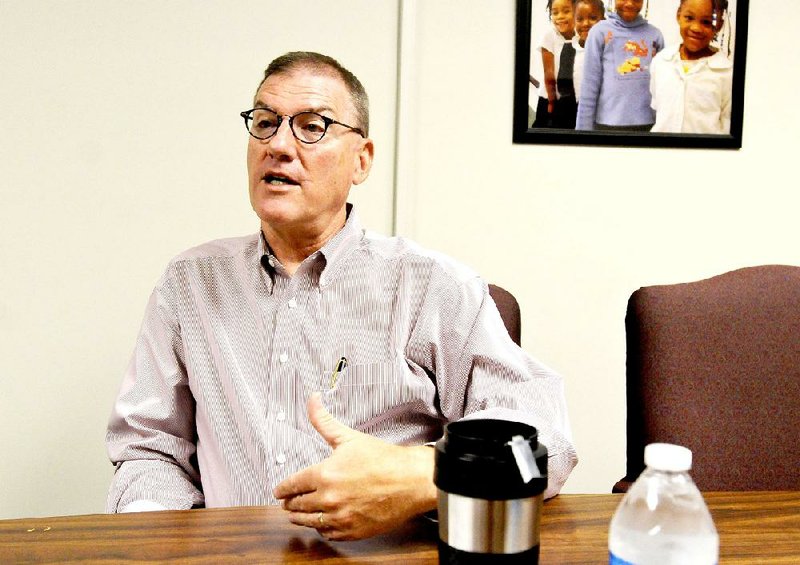The Walton Family Foundation of Bentonville will significantly increase its grants in Northwest Arkansas and the Delta over the next six years, with plans to invest $302 million in what it considers its "home region."
The grants will help fund everything from performing arts in Northwest Arkansas to Civil War and cultural heritage tourism in the Delta. In both areas, education will be a priority.
The foundation defines its home region as Northwest Arkansas and the Delta region of Arkansas and Mississippi.
From 2010 through 2013, the foundation's grants in the home region totaled $25 million to $40 million a year, said Rob Brothers, director of the foundation's home region focus area.
For the next few years, the amount will be between $42 million and $50 million a year, he said.
Those numbers exclude statewide education initiatives.
Last year, the foundation's home region grants included $18.9 million in Northwest Arkansas and $6 million in the Delta, according to its website.
In Northwest Arkansas, the home region grants helped pay for projects such as construction of bicycle paths and operation of the Trike Theater for youth in Bentonville.
Between now and 2020 in Northwest Arkansas, the foundation will focus on expanding high-achieving school options, establishing the region as a leader in arts and cultural amenities, strengthening regional economic development and preserving a "sense of place," which translates to making the area a more desirable place to live and one that will attract businesses, Brothers said.
'Catalytic grant-making'
In the Delta, the focus will be on improving education.
Last year, the Walton Family Foundation gave $4 million in grants to the Teach for America in the Delta. The organization provides teachers in poor communities.
Two counties in the Delta will receive more attention. In Phillips County and in Coahoma County, Mississippi, the foundation will work to improve public safety, engage and develop young people, and promote job creation in targeted industries, particularly Civil War and cultural heritage tourism.
The Battle of Helena on July 4, 1863, resulted in a Union victory. There were 239 Union casualties and 1,614 Confederate casualties, according to the Encyclopedia of Arkansas History and Culture.
Brothers said there had been a "scattered effort" to assist the impoverished Delta region many years ago. But the foundation decided it made more sense to target particular counties in the Delta.
That way, if programs worked in the targeted counties, they could be expanded to other areas, he said.
Brothers said the foundation has been investing in Helena-West Helena in Phillips County for more than 10 years.
The foundation's work in Coahoma County, where Clarksdale, Miss., is located, began about four years ago, he said.
"They're laboratories, if you will, for how catalytic grant-making might help make a difference," Brothers said of Phillips and Coahoma counties.
So far, there's anecdotal evidence of improvements in people's lives, Brothers said. But it's a long-term process, he said.
"If you drive through downtown Helena today and you look at what's going on there and you talk to people, you get a clear understanding that the grant-making we've done has impacted a lot of people's lives," said Brothers. "We just haven't moved that macroeconomic needle."
When asked why the Walton family of Northwest Arkansas had such a keen interest in the Delta, Brothers said because it's part of Arkansas.
"The Delta counties are among the poorest counties in our nation," he said. "If you study Arkansas history ... if you go back 70 or 80 years, the Delta counties were the wealthy counties, and where we live now, this was a hardscrabble existence up here. The worm has turned over a lot of years. It's part of Arkansas, part of the home region, and I think there's an interest in seeing if we can do some grant-making that will help make a difference."
Performing arts
Under the category of Northwest Arkansas education, the foundation will conduct a feasibility study to determine whether an independent private school is needed in Northwest Arkansas.
"I think there's been public interest expressed in an independent private school," said Brothers.
"So we're just trying to conduct a feasibility study to see whether or not an independent school would be supported, what size it might be, what tuition ranges, etc., would be, just to kind of help inform the decision."
A private school would fit into the foundation's overall strategy of trying to create high-achieving schools for students in pre-kindergarten through 12th grade, said Brothers.
The foundation will continue to assist with expanding public open-enrollment charter schools, he said. It will also work to concentrate on arts and cultural amenities, he said.
The foundation provided $1.2 billion to Crystal Bridges Museum of American Art in 2010. The museum opened the next year.
Now, emphasis will be placed on increasing the number of performances at performing arts centers and scheduling performers who will attract audiences from outside Northwest Arkansas, according to a news release from the foundation.
Sam Walton started the Walton Family Foundation in 1987. When he died in 1992, Walton left the foundation $172 million through a trust. The family foundation has grown through the years and held $2 billion in assets as of Dec. 31, 2012, according to a tax filing.
The foundation was the primary philanthropic vehicle for Sam and Helen Walton and their children: Alice, Jim, John and Rob. John Walton died in 2005 and Helen Walton died in 2007.
The home region is one of three primary areas where the foundation makes grants. Last year, in addition to grants that went to the home region, the foundation invested $164.2 million in nationwide education programs and $93.1 million for freshwater and marine conservation.
A Section on 08/20/2014
